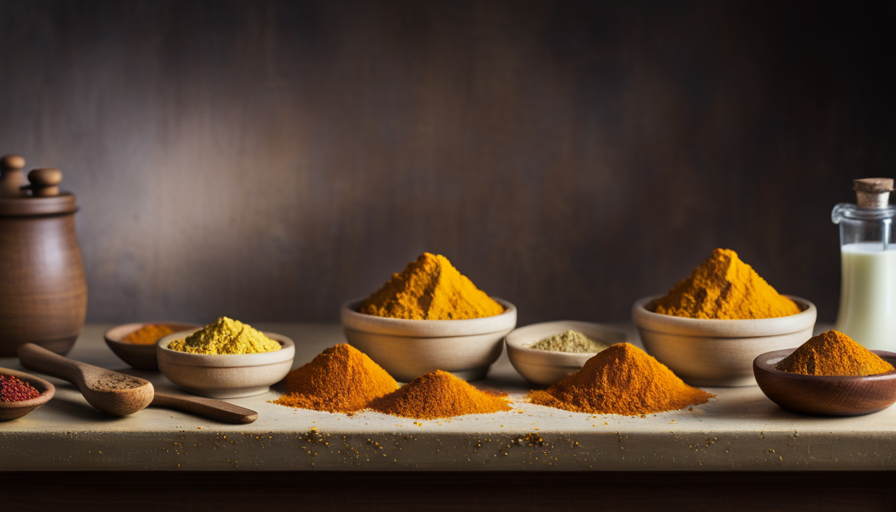Do you want to learn about the health benefits of turmeric tea? Are you interested in making your own? The answer is yes, and it’s simpler than you may realize!
Turmeric tea has been used for centuries in traditional Indian Ayurvedic medicine for its anti-inflammatory and antioxidant properties, and it’s now gaining popularity in the Western world for its numerous health benefits.
In this article, we’ll guide you through the process of making your own turmeric tea, from choosing the right ingredients to brewing and serving it. We’ll also explore the potential health benefits of turmeric tea, as well as any precautions and side effects you should be aware of.
Whether you’re a tea enthusiast looking to try something new or someone interested in natural remedies for health and wellness, making your own turmeric tea is worth a try!
Key Takeaways
- Turmeric tea can be easily made at home by simmering grated or powdered turmeric in water with a sweetener of choice for 10-15 minutes.
- Fresh turmeric is recommended for a more intense flavor and aroma, and higher levels of the anti-inflammatory compound curcumin.
- Turmeric tea has numerous health benefits, including boosting the immune system and providing antioxidants to protect cells from damage caused by free radicals.
- While turmeric tea is generally safe, excessive consumption can lead to digestive issues and may interact with certain medications, so it’s important to limit daily intake and consult a healthcare professional if needed.
Health Benefits of Turmeric Tea
You’ll be amazed at how many health benefits you can reap from sipping on a warm, homemade cup of turmeric tea! For starters, turmeric tea benefits your immune system as it contains curcumin, a compound with anti-inflammatory properties. It can help your body fight off infections and boost your overall health.
Additionally, turmeric tea is rich in antioxidants, which can protect your cells from damage caused by free radicals.
To make the most of the health benefits of turmeric tea, it’s important to use the right brewing techniques. The best way to brew turmeric tea is to simmer grated or powdered turmeric in water for about 10-15 minutes. This allows the curcumin to be released and fully absorbed into the water, maximizing its health benefits.
With these brewing techniques, you can easily make a cup of turmeric tea that’s loaded with health benefits. And, you might be surprised at how easy it is to make it yourself at home!
Now, let’s move on to the basic ingredients for making turmeric tea.
Basic Ingredients for Making Turmeric Tea
To whip up a batch of this aromatic brew, all you need are a handful of simple ingredients. The basic ingredients for making turmeric tea include turmeric powder, water, and some form of sweetener.
While turmeric powder is the main ingredient, the addition of honey or alternative sweeteners can enhance the health benefits and flavor of the tea. Adding honey to your turmeric tea can offer additional health benefits, such as its antibacterial properties and ability to soothe sore throats. However, if you’re looking for alternative sweeteners, options such as agave nectar and stevia can be used. These sweeteners are low in calories and can help balance the bitterness of turmeric.
Once you’ve chosen your preferred sweetener, you can proceed to the next step of choosing the right turmeric powder for your tea.
Choosing the Right Turmeric Powder
When choosing the right turmeric powder for your tea, there are a few key points to consider.
Firstly, you may want to decide between organic and non-organic options.
Secondly, you may want to consider whether to use fresh turmeric or powdered turmeric.
Lastly, it’s important to consider the quality of the turmeric you’re purchasing.
By taking these factors into account, you can ensure that you’re getting the best possible turmeric powder for your tea.
Organic vs. Non-Organic
If you want the full benefits of turmeric tea, consider opting for organic turmeric instead of non-organic. Although non-organic turmeric is more widely available and may be cheaper, organic turmeric is grown without synthetic pesticides and fertilizers. This means that there are no harmful chemicals present in the turmeric powder, and by extension, in your tea.
In addition, organic farming practices are better for the environment, as they promote healthy soil and biodiversity. When considering the cost comparison between organic and non-organic turmeric, it’s important to weigh the potential benefits against the price difference.
While non-organic turmeric may be more affordable, the long-term effects of consuming harmful chemicals may not be worth the savings. On the other hand, purchasing organic turmeric may be more expensive, but it ensures that you are getting a high-quality product that is free from harmful chemicals. By choosing organic, you’re not only benefiting your health, but you’re also supporting sustainable farming practices.
Moving on to the next topic, it’s important to consider whether to use fresh or powdered turmeric when making your own turmeric tea.
Fresh vs. Powdered
Consider using fresh turmeric when making your own turmeric tea to enhance the flavor and potency of the beverage. Fresh turmeric has a more intense flavor and aroma compared to the powdered form. It also contains higher levels of curcumin, the bioactive compound responsible for turmeric’s health benefits.
Turmeric supplements may be convenient, but they don’t provide the same nutritional benefits as fresh turmeric. The processing of turmeric supplements can reduce the levels of curcumin and other beneficial compounds. So if you want to get the most out of your turmeric tea, opt for fresh turmeric.
Moving forward, let’s discuss the quality of the turmeric you use for your tea.
Quality of the Turmeric
To ensure high-quality turmeric for your tea, look for a bright golden color, firm texture, and fresh aroma when selecting the root. Turmeric sourcing can be tricky, especially if you’re looking for organic and ethically sourced turmeric. Here are some things to consider when choosing the right turmeric for your tea:
- Look for turmeric that comes from a certified organic source.
- Consider purchasing from a fair trade certified company that supports small-scale farmers.
- Choose turmeric that has been sustainably harvested to minimize the impact on the environment.
- Check the country of origin to ensure that the turmeric is not sourced from areas with a history of questionable labor practices.
- Look for turmeric that has been packaged in a way that preserves its freshness and potency.
By taking these factors into consideration, you can be confident that you’re using high-quality turmeric for your tea.
Now that you’ve selected your turmeric, let’s move on to preparing your turmeric tea.
Preparing Your Turmeric Tea
First, start by boiling one cup of water and adding a teaspoon of ground turmeric to create your own homemade turmeric tea. Infusing flavors is an important step when preparing your turmeric tea.
You can add additional ingredients such as ginger, lemon, or honey to enhance the taste and increase the health benefits of the tea. Ginger, for example, has anti-inflammatory properties and can help with digestion, while lemon can boost your immune system with its high vitamin C content. Honey can also provide numerous health benefits, such as soothing sore throats and improving your skin health.
When it comes to preparing your turmeric tea, there are several brewing methods to choose from. Some people prefer to steep the turmeric in hot water for several minutes, while others prefer to boil the turmeric with other ingredients to create a more flavorful tea.
Once your tea is brewed, you can serve it hot or cold, depending on your preference. In the next section, we’ll discuss the best brewing and serving methods for your homemade turmeric tea.
Brewing and Serving Your Turmeric Tea
Now it’s time to brew and serve your delicious and healthy turmeric tea in a way that will leave your taste buds satisfied and your body feeling rejuvenated. Here are some brewing tips and serving suggestions to make your turmeric tea experience even better:
-
Brewing tips:
-
Use fresh, high-quality turmeric root for the best flavor and health benefits.
-
Boil water and add sliced turmeric root and optional ingredients like ginger, cinnamon, or honey.
-
Let the tea simmer for 10-15 minutes to allow the flavors to infuse.
-
Strain the tea and serve hot or cold.
-
Experiment with different ingredients and ratios to find your perfect turmeric tea recipe.
-
Serving suggestions:
-
Add a squeeze of lemon or lime for a refreshing twist.
-
Enjoy the tea as is or add milk or a non-dairy alternative for a creamy texture.
-
Serve in a clear glass mug to showcase the vibrant yellow color of the turmeric.
-
Pair with a healthy snack like nuts or fruit for a satisfying and nutritious snack.
-
Drink turmeric tea regularly to experience its many health benefits.
Now that you know how to brew and serve your turmeric tea, it’s important to know how to store it properly.
Storing Your Turmeric Tea
When storing turmeric tea, it’s important to keep it in an airtight container to prevent oxidation, which can reduce its potency over time.
Turmeric tea can last for up to a week when refrigerated, but it’s best to consume it within 2-3 days for optimal freshness and flavor. You can also freeze turmeric tea in ice cube trays and use them as needed.
To extend the shelf life of your turmeric tea, you can add natural preservatives like lemon juice or honey. Lemon juice has citric acid, which acts as a natural preservative, while honey has antimicrobial properties that can help prevent the growth of harmful bacteria. However, it’s important to note that adding these ingredients may alter the taste of your turmeric tea.
Moving on to variations on the basic recipe, there are different ways to customize your turmeric tea to suit your taste preferences.
Variations on the Basic Recipe
To switch things up, try adding a dash of cinnamon and a splash of almond milk to create a cozy and comforting turmeric latte. Flavor variations are a great way to add excitement to your daily turmeric tea routine. Adding health-boosting ingredients such as ginger, lemon, and honey can also enhance the benefits of this superfood tea.
Ginger is a natural anti-inflammatory that can improve digestion and relieve nausea. Adding a few slices to your turmeric tea can enhance its flavor and increase its health benefits.
Lemon is a great source of vitamin C and can help boost your immune system. A squeeze of lemon juice can also add a bright and refreshing flavor to your turmeric tea.
Honey is a natural sweetener that can soothe a sore throat and has antibacterial properties. Adding a drizzle of honey to your turmeric tea can provide a touch of sweetness while also boosting its health benefits.
Incorporating flavor variations and health-boosting ingredients can make your daily turmeric tea routine more exciting and beneficial. However, it’s important to remember that proper storage and brewing techniques are also crucial for maximizing the benefits of turmeric tea for health and wellness.
Turmeric Tea for Health and Wellness
Turmeric tea is a powerful elixir that can improve overall health and wellness, acting as a natural remedy for various ailments. Drinking it daily can provide numerous benefits, including reducing inflammation, boosting immunity, aiding digestion, and improving skin health. There are many turmeric tea recipes to choose from, each with their own unique flavor and medicinal properties.
To help you get started, here is a table of popular turmeric tea recipes and their corresponding benefits:
| Recipe | Ingredients | Benefits |
|---|---|---|
| Golden milk | Turmeric, milk, honey | Boosts immunity, relieves joint pain |
| Ginger-turmeric tea | Turmeric, ginger, honey, lemon | Aids digestion, reduces nausea |
| Turmeric-lemon tea | Turmeric, lemon, honey | Detoxifies liver, improves skin health |
Incorporating turmeric tea into your daily routine can have positive effects on your overall health and wellness. However, it is important to be aware of any potential precautions and side effects, which we will discuss in the next section.
Precautions and Side Effects
Before you start consuming turmeric tea regularly, it’s important to be aware of some precautions and side effects.
Firstly, excessive consumption of turmeric can lead to digestive issues, such as bloating and diarrhea.
Secondly, turmeric may interact with certain medications, including blood thinners and diabetes medications.
Lastly, some people may be allergic to turmeric, causing symptoms such as itching, hives, and difficulty breathing.
Be sure to consult with your healthcare provider before adding turmeric tea to your daily routine.
Avoiding Excessive Consumption
Hey, did you know that it’s important to moderate how much turmeric tea you drink to avoid any negative side effects?
While turmeric has numerous health benefits, consuming too much of it can have adverse effects on your digestion. Some people have reported experiencing stomach discomfort, bloating, or diarrhea after consuming large amounts of turmeric.
To avoid such adverse effects, it’s recommended that you limit your daily intake of turmeric tea to no more than 3-4 cups per day. Additionally, it’s important to keep in mind that the amount of turmeric you consume in your meals should also be taken into account. If you’re already consuming a lot of turmeric in your food, you may want to reduce the amount of turmeric tea you drink per day.
It’s important to be mindful of your turmeric intake not only to avoid digestive issues but also to prevent any possible interactions with medications.
In the next section, we’ll explore some medications that may interact with turmeric and how to avoid any negative effects.
Possible Interactions with Medications
It’s crucial to be mindful of possible interactions with medications when consuming turmeric, as it can have adverse effects on your health and well-being. Turmeric contains compounds that can interfere with certain medications, such as blood thinners and diabetes medications. These interactions can lead to potential risks and complications, such as increased bleeding or decreased blood sugar levels. Therefore, it’s important to consult a healthcare professional before consuming turmeric if you are taking any medications.
To better understand the potential risks and drug interactions of turmeric, take a look at the following table:
| Medications | Potential Interactions with Turmeric |
|---|---|
| Blood Thinners | Increased risk of bleeding |
| Diabetes Medications | Decreased blood sugar levels |
| Stomach Acid Medications | Decreased effectiveness |
| Chemotherapy Drugs | Interference with effectiveness |
| Anti-Inflammatory Drugs | Increased risk of bleeding |
If you are taking any of these medications, it’s important to consult a healthcare professional before adding turmeric to your diet. They can help you determine if it’s safe to consume and provide guidance on appropriate dosages. In the next section, we will discuss another potential concern when consuming turmeric – allergic reactions.
Allergic Reactions
Now that you’re aware of the possible interactions between turmeric and certain medications, it’s important to also consider the potential for allergic reactions. While turmeric is generally considered safe for consumption, some people may experience allergic reactions to it.
Common allergens associated with turmeric include ginger, cardamom, and yellow food coloring. Symptoms of an allergic reaction can range from mild to severe and may include skin rash, itching, hives, swelling of the face or throat, difficulty breathing, and even anaphylaxis.
If you suspect that you may be allergic to turmeric, it’s important to seek medical attention immediately. Treatment may include antihistamines, corticosteroids, or epinephrine depending on the severity of the reaction.
As with any dietary supplement or medication, it’s important to consult with your healthcare provider before adding turmeric to your routine.
Frequently Asked Questions
How long does it take to see the health benefits of drinking turmeric tea?
You may begin to see the health benefits of drinking turmeric tea after a few weeks of consistent use. The recommended dosage for turmeric tea is 1-2 teaspoons of turmeric per cup of water. Some benefits include reduced inflammation, improved brain function, and lower risk of chronic diseases.
Can you use fresh turmeric root instead of turmeric powder?
Fresh turmeric root can be used in cooking and provides a more potent and flavorful experience than turmeric powder. However, turmeric powder has benefits in skincare due to its concentrated curcumin content.
Is it safe to drink turmeric tea while pregnant or breastfeeding?
It is generally safe to drink turmeric tea while pregnant or breastfeeding, but safety concerns exist for high doses. Dosage recommendations vary, but 1-1.5 grams/day of turmeric is likely safe. Consult with your healthcare provider before consuming turmeric tea.
Can I add sweeteners like honey or sugar to my turmeric tea?
Did you know that Americans consume an average of 17 teaspoons of added sugar per day? Adding honey or sugar to your turmeric tea only increases this intake. Try using natural sweeteners like stevia or monk fruit instead.
Can turmeric tea be used as a natural remedy for headaches or migraines?
Turmeric tea is a popular natural remedy in alternative medicine for headaches and migraines due to its anti-inflammatory properties. While making your own tea is possible, it’s important to consult with a healthcare provider before using it as a treatment.
Conclusion
Congratulations! You now know how to make your own turmeric tea. By following the simple steps outlined in this article, you can experience the numerous health benefits that turmeric tea has to offer.
Turmeric is a natural anti-inflammatory and antioxidant, which can help boost your immune system and improve your overall health and wellness. Plus, making your own turmeric tea is a great way to save money and customize your recipe to suit your taste preferences.
Remember to choose high-quality turmeric powder and store your tea properly to ensure it stays fresh and potent. And as with any new addition to your diet, be sure to consult with your healthcare provider to ensure it’s safe for you to consume.
So, go ahead and enjoy a warm cup of turmeric tea today!










